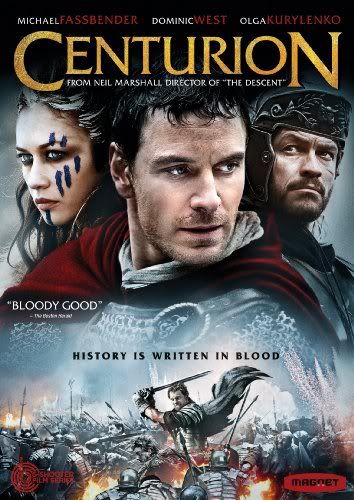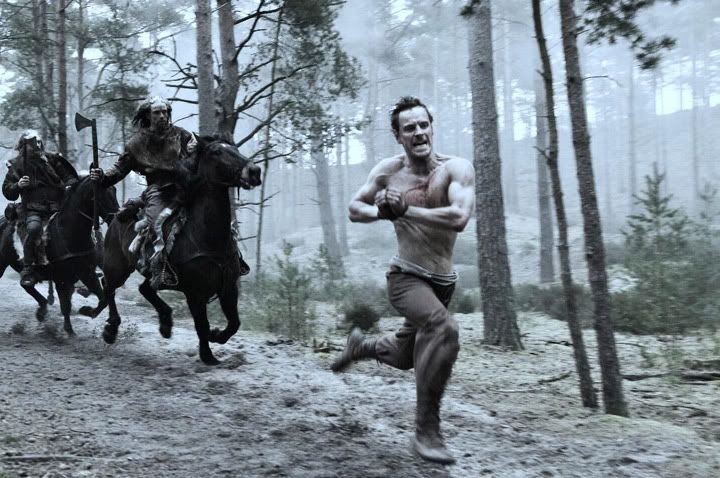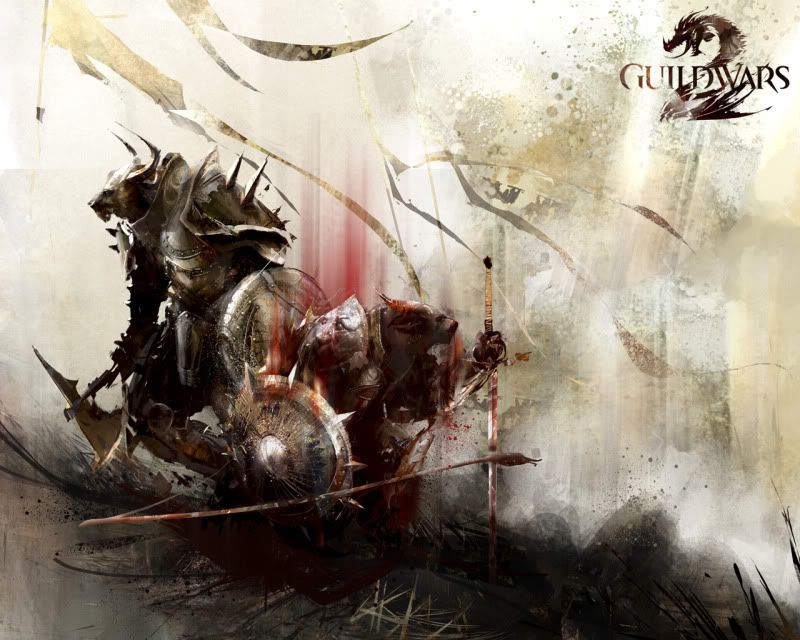
[audio:http://www.blueinkalchemy.com/uploads/centurion.mp3]
The movie version of 300 has definitely made an impression. It’s given us a ton of Internet memes, helped shape all sorts of workout regimens and pushed Gerard Butler towards being the stereotypical big scowly action star. But it also had the subtle benefit of introducing the world to Michael Fassbender. In between his memorable supporting turn in Inglorious Basterds and being exactly the sort of Magneto fans have been craving in X-Men: First Class, he took the lead in another period action-adventure called Centurion, but to say this movie and 300 couldn’t be more different is something of an understatement.

Fassbender is cast as Quintus Dias, a centurion serving as second-in-command at a Roman border post in Britain around AD 117. His garrison is destroyed and he captured by the vicious Picts. When he’s rescued, it’s by the legendary 9th Legion, which is given orders to stomp their way north to wipe the Picts out. This, unfortunately for the Romans, goes pretty horribly and Quintus tries to lead the handful of survivors home while a Pict hunting party lead by an exceedingly scary young woman tracks them down.
At first, Centurion seems more driven by plot than characters. Unlike other movies that establish their ensemble cast as quickly as possible, writer-director Neil Marshall carefully paces the opening to give us the information, atmosphere and tensions of the age before really diving into the characters we’re going to spend the next 90 minutes with. I haven’t seen any of Marshall’s other work – Dog Soldiers, The Descent or Doomsday – but he certainly seems to have a good grip on pacing in his writing, and clean shots in his direction, as well as an unflinching and visceral taste for combat.

With those metal weapons, Magneto would have sorted the Picts out in about 3 seconds flat.
As the characters begin to emerge, their roles grow organically out of the flow of the story. Most of them are cyphers or stereotypes, but their delivery is earnest and the writing of their lines decent without either verging into ham-handedness. When the 9th falls, it’s a sad moment, but it’s difficult to care as much as Our Lady of Soundtrack Sorrow wants us to. The deaths of individuals later in the story means far more than the wholesale slaughter of faceless Roman soldiers. It’s not that I’m expecting Marshall to compel us to care about all 3000 of the Romans, and the characters we do get are certainly better than many of their modern counterparts, I just feel that some of the drama’s a little overwrought.
This is a tale that owes far more to HBO’s Rome mini-series than to Ridley Scott’s Gladiator. As these characters grow and interact they do so in ways that seem earnest and unforced. Fassbender’s Quintus in particular shows not only brotherly concern for his fellow men but a growing bitterness at their circumstances and a grudge against both sides in the conflict. And neither the Romans nor the Picts emerge as the ‘good guys’ in the war. Keeping the moral ground gray between the two of them was very wise on Marshall’s part, as it keeps the focus on the dwindling number of actual characters caught between these rather dickish powers.

Trust me. She’s pretty scary.
While many other period pieces go for a stew of anachronisms, playing devil-may-care with the technologies and languages available to a given set of peoples, Centurion actually has a great deal of authenticity going for it. While the Romans speak English for our convenience, their arms and armor are right out of the Empire’s heyday, and the dwellings and lifestyle of the Picts is masterfully depicted, from their means of restraining prisoners to the status of their women. Between this, the characters and the smart plotting, there’s a lot to like about this movie.
It doesn’t quite delve into the naked melodrama of Edward Zwick’s Last Samurai or Defiance nor does it play up the violence or spectacle for its own sake as 300 does. Centurion opts instead to tell a decent story about survivors behind enemy lines and does that job rather well. The characters we do get are interesting and well-acted, the story never bogs down or feels overly contrived and the action feels authentic and visceral without being completely over-the-top, which all adds up to an enjoyable adventure story bordering on the excellent. It does everything right that pointless slapped-together flicks like The Expendables get wrong. Consider checking it out on Netflix Instant if you’re on the lookout for an action-adventure or period piece with at least a bit of a brain in its head. And while I mentioned I haven’t seen any of Marshall’s other work, considering he’s put together a movie about werewolf soldiers and one that’s described as Mad Max driving headlong into 28 Days Later… I think I’m going to have to correct that.
Josh Loomis can’t always make it to the local megaplex, and thus must turn to alternative forms of cinematic entertainment. There might not be overpriced soda pop & over-buttered popcorn, and it’s unclear if this week’s film came in the mail or was delivered via the dark & mysterious tubes of the Internet. Only one thing is certain… IT CAME FROM NETFLIX.






